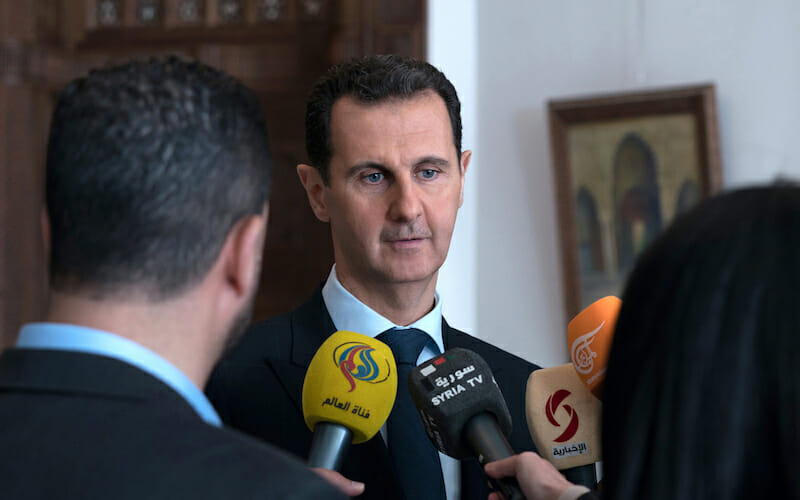
Calling Assad the Milosevic of the Middle East is Not Unreasonable
In his latest interview with CNN’s Christiane Amanpour in February 2017 in Munich, Iranian Foreign Minister Javad Zarif made it clear that he doesn’t agree with the description that the Syrian President Bashar al-Assad is the “Milošević of the Middle East.”
Slobodan Milošević was the first President of the Republic of Serbia charged by the International Criminal Tribunal for the former Yugoslavia (ICTY) with war crimes in connection to the wars in Bosnia, Croatia, and Kosovo. The Yugoslav politician finally died in his prison cell in The Hague in 2006 without being convicted.
Now, a politician who is facing a whole load of similar accusations, including war crimes and crimes against humanity, is running Syria while the provision of spiritual, financial, logistical and other sorts of support by a number of countries, including Iran, is helping him to sustain his domination. The Syrian President Bashar al-Assad is sporadically being referred to as the Milošević of the Middle East and of course those countries who are assisting Assad are either complicit in his crimes or are ready to take credit for what he is doing to his people. There are estimations that some 400,000 people have died since the beginning of the civil war. The opposition group Syrian Observatory for Human Rights reported in mid-March that 19,811 children and 12,513 women are among the victims of this vicious war overseen by President Assad.
The ongoing unrest in Syria, which is part of the wider wave of 2011 Arab Spring protests, and is rooted in public discontent with Assad’s handling of Syria’s economy, the Arab country’s poor human rights record, unemployment and other socioeconomic inequalities, is now a scene for some of the world powers and their allies to flex muscles and even test their military finesse on the ground.
Iran, Russia, Lebanon’s militant organization Hezbollah are on Assad’s side and there are other belligerents: Syrian opposition, mainly the Free Syrian Army aided by Turkey; the ISIS terrorists and the Democratic Union Party assisted by the U.S. Army.
It might be that Iran’s persistence on colluding with Assad against the United States and a coalition of foreign forces is rooted in its leaders’ ideological convictions: considering saving Syria, a Muslim-majority nation, and supporting its president, a mission that Iran should accomplish, either alone or with the support of its allies. However, it doesn’t take complicated statistics and figures to understand that the Syrian people are not happy with the continuation of this erosive war anymore and Iran’s role-playing is no more constructive.
World Happiness Report 2018 ranks Syria 150 out of 156 countries surveyed from various perspectives definable under or related to “happiness.” Life expectancy in Syria at 69.51 is one of the lowest in the world. Happy Planet Index 2018 considers Syria to be 113th country out of 140 in “sustainable wellbeing for all.” Unemployment rate is about 40% and people’s day to day life is affected by politics and power games. All of these figures aside, thousands have been killed in the civil war, and infrastructure for the treatment of war-stricken citizens or those suffering from the wounds of war doesn’t exist.
When such conflicts become inconclusive, the external parties also become less willing to reduce their interventionist role lest they lose part of the battle they are credited for igniting or sustaining. This informal principle applies to all international conflicts or wars. A clear example is the Iran-Iraq war, which started in 1980 and lasted eight years to claim about 1 million lives only because the Iraqi dictator continued to receive military, political and media support from the United States and some 20 European countries, and also because Iran, the other warrying party, was under the impression that accepting a ceasefire, enforced by the United Nations, would be an admission of a defeat.
Now, the situation in Syria is characterized by a big mess that takes several years to be rectified and mended even if it comes to an end right now. Egypt and Tunisia that were the instigators of the Arab Spring experienced improvements when their leaders stopped clinging to power and accepted that resignation from forcibly ruling a people that didn’t want them would be the most logical and viable solution.
Now, it has been some 18 years since Bashar al-Assad was first elected the President of Syria. All but one of the elections in which he was elected and reelected president had only one candidate. Moreover, it’s quite clear that a politician cannot remain undisputedly popular for two decades. Furthermore, the countries in which a single politician remains leader for decades without being contested or challenged are countries in which democracy rarely makes sense. These are countries in which the public have minimal to no experience of “the right to challenge and question.”
Iran is grappling with its own domestic dilemmas and questions, including popular discontent with the economy and social grievances which the government has never addressed compellingly. At the same time, it’s a country, which dreams of being a regional and global superpower. It considers allying with Russia in helping Assad in a tiring war one of the ways to exert its transregional identity. It’s exactly the same way the United States sustains and unconditionally supports Israel, what it calls the “only democracy in the Middle East,” in an exhausting and grueling war against the Palestinians.
Neither Iran nor the United States can boast of doing something extraordinary or useful by contributing to the prolongation of wars that are claiming lives and making the Middle East less peaceful and inhabitable every day. Global observers understand where these wars are headed, and who is on the right side. However, for Iran to continue supporting the Syrian leader and refusing to publicly call Bashar al-Assad the Milošević of the Middle East is not justifiable, nor is it an application of political correctness. When Javad Zarif refused to agree with Christiane Amanpour, he was most probably thinking of keeping his seat at the Ministry of Foreign Affairs of Iran after the conclusion of his trip to address the Munich Security Conference.
